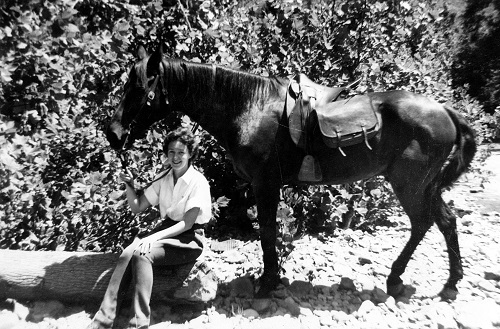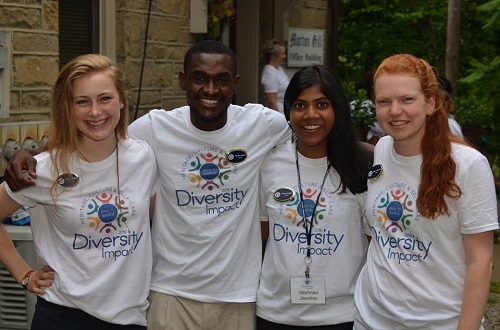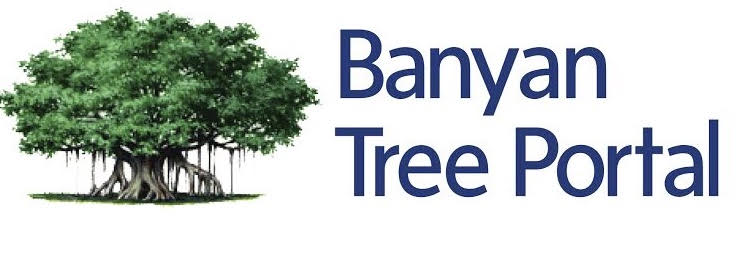Frontier Nursing Service, Frontier Nursing University, and the Courier Program
Throughout its long history, the Courier Program has contributed to Frontier’s success. Couriers joined the various parts of the FNS and connected it with the outside world. Indeed, in an important sense, Couriers have always served as Frontier Nursing Service ambassadors. Couriers take the FNS message back to their communities in large part because Couriers experience the skilled, professional, compassionate care of FNS nurses and physicians in a personal way. Couriers’ specific tasks have varied according to the needs of the service, from grooming horses and holding a flashlight during births in the early years, to serving the local community in ways the busy nurses did not have time to do in later years. Couriers’ contributions have also evolved based on the ways in which nurses worked and traveled, especially with the change from district nursing to hospital and home health nursing, and from journeying by horse to Jeep to sport utility vehicle. No matter the setting or the task, Couriers have been stalwart behind-the-scenes workers.
Born in 1881, Mary Breckinridge graduated from St. Luke’s Hospital Training School for Nurses in New York in 1910. Inspired by the loss of two of her own children, Mrs. Breckinridge dedicated her life to the care of children. From 1918-19 she worked with midwives and nurse-midwives in France. She returned to her home in rural Leslie County, Kentucky, in 1923 and conducted a survey that demonstrated the need for nursing and midwifery services in the area. Mrs. Breckinridge traveled to Woolwich, England, in 1924-25 to complete midwifery training.
When Mrs. Breckinridge returned to Kentucky, she was instrumental in establishing the Kentucky Committee for Mothers and Babies, the first organization in America to use nurses trained as midwives under the direction of a single doctor. The Kentucky Committee for Mothers and Babies was renamed the Frontier Nursing Service (FNS) in 1928. That same year, the Hyden (Kentucky) Hospital opened and was staffed by one physician and FNS nurse-midwives. That is when the FNS Courier program began.

The Courier Service is completely interwoven into that of the FNS. The FNS, one of the earliest organizations in the United States to combine nursing with midwifery and public health care, had a service area that was one of the most isolated and medically underserved areas of the southern United States, spanning over 1,000 square service miles and serving over 10,000 people. In the beginning, nurses traveled almost exclusively on horseback because the area lacked infrastructure. The area had devastatingly high maternal and infant mortality rates and rampant childhood illnesses. While the early nurses were called midwives, their scope and reach extended well beyond what is thought of when one says nurse-midwife. From vaccination clinics created to eradicate communicable and fatal diseases, to treating sick horses, to what would be considered primary care today, the scope of work was wide.
The Courier Program was created in 1928 mainly because the FNS needed assistance in a non-clinical capacity. Most of the early Couriers were debutantes who wanted to learn about service to humanity. In the early years, Couriers ferried supplies across rugged mountain terrain, cared for the FNS’s valuable transportation assets (the horses) and other animals, carried vital messages in an area without telephones or reliable mail service, transported sick patients, escorted FNS visitors, and completed mundane tasks that did not require the expertise of the highly trained nurses, whose time was far too valuable to spend on non-nursing chores. In addition to non-clinical assistance, such as laying newspaper down for exams and holding a candle during delivery, Couriers also served as much needed respite for FNS nurses who frequently served in isolation in their respective outpost clinic. These nurses were under tremendous pressure to heal ill patients, maintain their professional demeanor, and adhere to the cultural norms inherent in working with mountain people, and having a Courier at her side gave each nurse added emotional reserves to accomplish her work.
Eventually, the FNS moved from riding horses to driving Jeeps, but the jobs for the Couriers remained largely the same. The 1980s, 90s, and 2000s saw a shift away from volunteer service that focused on carrying out manual chores necessary to keep the FNS operating and toward an outward community volunteerism focus. Much of this newer type of volunteerism reflected individual Courier preferences and the very specific needs of the community.

After a brief hiatus when the FNS closed, FNU took the Courier Program under its wings in 2013. Honoring the original mission, today’s couriers interface with the community through rural site placements and community agencies. These Couriers perform non-clinical tasks for rural clinics and lend a very needed hand to local organizations and nonprofits who are frequently doing more with less.

